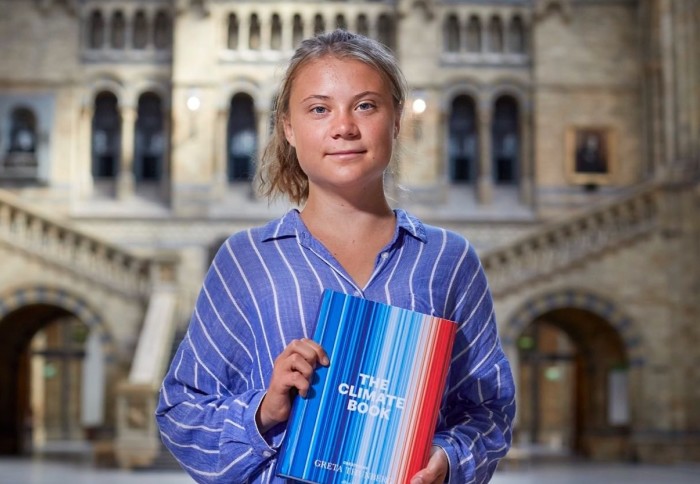Imperial scientists appear in first book by teen climate activist Greta Thunberg

Two experts on cloud science and dangerous weather contributed to a newly published ‘essential guide for saving the planet’.
Dr Friederike Otto, Senior Lecturer in Climate Science, and Dr Paulo Ceppi, Lecturer in Climate Science, at the Grantham Institute – Climate Change and the Environment at Imperial College London are part of a 100-strong team of world experts brought together by Greta Thunberg to contribute to a new publication, The Climate Book.
Billed as an ‘essential handbook for saving the planet’, the book includes contributions by experts in geophysics, oceanography, meteorology, engineering, economics, mathematics, history, philosophy, as well as community and indigenous leaders from around the world.

Alongside them, the 19-year-old Swedish activist who shot to global fame through her ‘Skolstrejk for kilmatet’ (trans: School strike for the climate), shares her own stories of demonstrating and uncovering greenwashing around the world.
Dr Ceppi, who wrote a chapter in the book about the effect that clouds have on amplifying global warming, said:
"The Climate Book covers climate change in a comprehensive way, from basic physics to economics and social justice. This makes the book an extremely timely contribution as societies face the challenge of rapidly reducing carbon emissions to net zero.
“I feel privileged to have been invited to contribute to this book bringing together so many leading voices in climate research from around the world. I hope this will be an enlightening read for anyone wanting to know why climate change is happening, and what they can do about it.”
 Ms Thunberg, who is one of the world’s most recognisable climate activists, spoke at an event at London's South Bank Centre on 30 October. She said:
Ms Thunberg, who is one of the world’s most recognisable climate activists, spoke at an event at London's South Bank Centre on 30 October. She said:
"Don’t listen to me, listen to the scientists, listen to the experts, listen to those who are most affected. This is the biggest story in the world, and it must be spoken as far and wide as our voices can carry, and much further still.
“My hope is that this book might be some kind of go-to source for understanding [the] different, closely interconnected crises.”
Excerpt from ‘Dangerous Weather’
 In Chapter 2.7, 'Dangerous Weather', Dr Otto (pictured) explains attribution science, and how it has evolved to be able to estimate the contribution of climate change to extreme weather events:
In Chapter 2.7, 'Dangerous Weather', Dr Otto (pictured) explains attribution science, and how it has evolved to be able to estimate the contribution of climate change to extreme weather events:
From [attribution] science we know with high confidence that, when a storm happens, the associated level of rainfall is higher than it would be in a world without climate change. In the case of Hurricane Harvey, which catastrophically flooded Houston, Texas, in 2017, this means that it would have rained 15% less without human-caused climate change.
Fifteen per cent might not sound a lot, but when translating it to costs it becomes clear just how catastrophic human-made climate change is, even in a single storm. The overall costs of the rainfall associated with the storm were estimated at $90 billion, $67 billion of which can be attributed to the extra rain due to climate change.
It is important to highlight that these are only the economic damages. The impacts on individual lives – from fatalities to livelihoods lost – are much harder to quantify, but there is considerable suffering, especially for the most vulnerable in society.
Excerpt from ‘Clouds’
 In Chapter 2.5, 'Clouds', Dr Ceppi explains the warming and cooling effects of clouds:
In Chapter 2.5, 'Clouds', Dr Ceppi explains the warming and cooling effects of clouds:
Recent scientific advances have led climate scientists to the conclusion that clouds are amplifying global warming…
It is important to stress that this amplifying cloud feedback does not mean that climate change will be even worse than we imagined: the possibility of clouds amplifying global warming has been accounted for in climate change projections for a long time. Nevertheless, the newest scientific evidence does confirm that we cannot count on clouds to suppress global warming.
Furthermore, it is possible that the amplifying effect of clouds becomes stronger as the climate warms, or worse, that clouds act as a tipping point beyond a certain level of carbon dioxide concentration. To avoid such low-likelihood, high-risk outcomes, the safest path is to rapidly cut carbon emissions now.
Media and culture launchpad for climate action
Speaking at the launch of the book at the Southbank Centre, Ms Thunberg called for more people to me made aware of climate change though the mainstream media and other cultural mediums. She said:
"Many journalists want to write more about the climate crisis. But they aren’t allowed by their editors. We need the media desperately. The biggest entity is the media to reach out to as many people as we need. They are in the driving seat."
This years' Grantham Institute Annual Lecture will be delivered by reknowned musician and music producer Brian Eno, and will discuss the role of arts and culture in climate activism.
Grantham Institute 2022 Annual Lecture
The ever-growing climate movement: Creating & shaping climate change narratives through culture, creativity & innovation
This event will begin with a keynote speech from Brian Eno, a highly influential musician, producer, visual artist and activist who reformed the music industry’s action toward climate change. This will be followed by a panel discussion that will include other artists and creators of culture. The panel will discuss how culture can shape collective mobilisation, individual behaviour change and action in tackling climate change in our modern world.
--
Header image credit: Natural History Museum, London.
Article text (excluding photos or graphics) © Imperial College London.
Photos and graphics subject to third party copyright used with permission or © Imperial College London.
Reporter
Jez Fredenburgh
The Grantham Institute for Climate Change